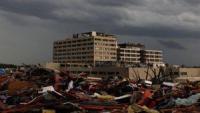-
Biotechnology advances offer opportunities for actors with malicious intent
Over the past decade, the biotechnology economy has experienced remarkable growth, resulting in the rapid expansion of biological knowledge and application. These advances create openings for actors with malicious intent to harness readily available tools and techniques to create biological threats or bioweapons.
-
-
Offshore wind energy potential not exploited by U.S. energy companies

When it comes to wind energy, the United States is sitting on a gold mine, so to speak. It’s a moment of untapped potential that, if harnessed properly, could transform the way the U.S. uses energy, one expert says.
-
-
Satellite technology detects, and may prevent, genocide
Many of the world’s worst human rights abuses, including genocides, occur in areas that are difficult to observe. “Smallsat” — short for small satellite — technology can detect human rights abuses and violations. The information collected by this technology provides evidence that can be used to corroborate refugee accounts of atrocities in international courts.
-
-
Cyber toolkit for criminal investigations
cybercrimes reached a six-year high in 2017, when more than 300,000 people in the United States fell victim to such crimes. Losses topped $1.2 billion. Cybercriminals can run, but they cannot hide from their digital fingerprints.
-
-
Do we need a moratorium on germline gene editing?
In the wake of the news from China about He Jiankui’s gene-edited babies, many scientists are calling for a moratorium on germline gene-editing. Nature considered the topic sufficiently important to publish the call by several top researchers and ethicists for a moratorium.
-
-
Mitigating impact of rising seas, storms along California’s coast
New coastal modeling research presents state, federal, and commercial entities with varying storm and sea level-rise scenarios to assist with planning for future infrastructure and mitigation needs along the California coast.
-
-
Droughts caused permanent loss to major California groundwater source
California’s Central Valley aquifer, the major source of groundwater in the region, suffered permanent loss of capacity during the drought experienced in the area from 2012 to 2015.
-
-
February 2019 ranked fifth hottest month on record for the globe
We recently concluded the second full month of 2019, and already the year to date has turned out on the warm side. Steady warmth around the globe made February the fifth hottest on record. Seasonally, the period from December 2018 through February 2019 ranked fourth hottest on record.
-
-
Potential impacts of future heat waves on humans and wildlife
Climate change is often talked about in terms of averages — like the goal set by the Paris Agreement to limit the Earth’s temperature increase to 2 degrees Celsius. What such numbers fail to convey is that climate change will not only increase the world’s average temperature, it will also intensify extreme heat waves that even now are harming people and wildlife.
-
-
Keeping first responders, high-risk workers safer
Researchers have created a motion-powered, fireproof sensor that can track the movements of firefighters, steelworkers, miners and others who work in high-risk environments where they cannot always be seen.
-
-
Smart sensor to enhance emergency communications
First responders run toward danger; their jobs require it. Often, their only connection to the outside world during these rescue missions is their colleagues at the command centers who coordinate the rescue effort. with the ubiquity of IoT devices now, first responders have access to a vast, timely, and smart network of connections to the outside world.
-
-
Feeling the heat: Recognizing the risks of extreme weather
Heat waves are more dangerous than tornadoes, statistically. They kill more people than sharks, and put more human lives at risk than blizzards, floods or lightning storms. But they lack a certain dramatic flair, making it surprisingly difficult for many people to grasp and evaluate the real danger lurking behind their devastating effects. Recognizing those risks could be a matter of life or death – especially as a changing climate is making dangerous extreme heat events more and more likely every year in the United States.
-
-
Human brains vulnerable to voice morphing attacks

A recent research study investigated the neural underpinnings of voice security, and analyzed the differences in neural activities when users are processing different types of voices, including morphed voices.The results? Not pleasing to the ear. Or the brain.
-
-
Dealing with disaster

It took less than 90 minutes before students in Miaki Ishii’s first-year seminar started to talk openly about revolt. The unrest, however, wasn’t due to any political issue currently making headlines, but to a small room in Harvard’s Geological Museum and a handful of their classmates. The students took part in a role-playing game that saw them acting as citizens of the island of Montserrat, the tiny country’s government, and a group of scientists monitoring the island’s volcano. Why revolt? Because the students soon grew skeptical of the government’s ability to quickly and effectively respond to pressing environmental concerns.
-
-
Climate tool points to end of winter by 2050
Researchers have designed a tool which takes existing data and communicates the impacts of climate change in a way that people can engage with and better understand. The resulting new climate tool visualizes data which shows by 2050, Australians will no longer enjoy winter as they know it today and will experience a new season the designers are calling “New Summer.”
-
More headlines
The long view
The Future of Open Data in the Age of AI: Safeguarding Public Assets Amid Growing Private Sector Demands
AI offers immense potential, but that potential must be realized within a framework that protects the public’s right to its own information. The open data movement must evolve to meet this new challenge—not retreat from it.
Horses for Courses: Where Quantum Computing Is, and Isn’t, the Answer
By Stephan Robin
Despite the impressive and undeniable strides quantum computing has made in recent years, it’s important to remain cautious about sweeping claims regarding its transformative potential.
Federal R&D Funding Boosts Productivity for the Whole Economy − Making Big Cuts to Such Government Spending Unwise
By Andrew Fieldhouse
Large cuts to government-funded research and development can endanger American innovation – and the vital productivity gains it supports. If the government were to abandon its long-standing practice of investing in R&D, it would significantly slow the pace of U.S. innovation and economic growth.
Why Ukraine’s AI Drones Aren’t a Breakthrough Yet
By David Kirichenko
Machine vision, a form of AI, allows drones to identify and strike targets autonomously. The drones can’t be jammed, and they don’t need continuous monitoring by operators. Despite early hopes, the technology has not yet become a game-changing feature of Ukraine’s battlefield drones. But its time will come.
New Tech Will Make Our Airplanes Safer
By Yulia Karra
Odysight.ai’s technology allows for constant monitoring of aircraft, sending alerts in case of malfunctions that could lead to accidents.
New Technology is Keeping the Skies Safe
DHS S&T Baggage, Cargo, and People Screening (BCP) Program develops state-of-the-art screening solutions to help secure airspace, communities, and borders
